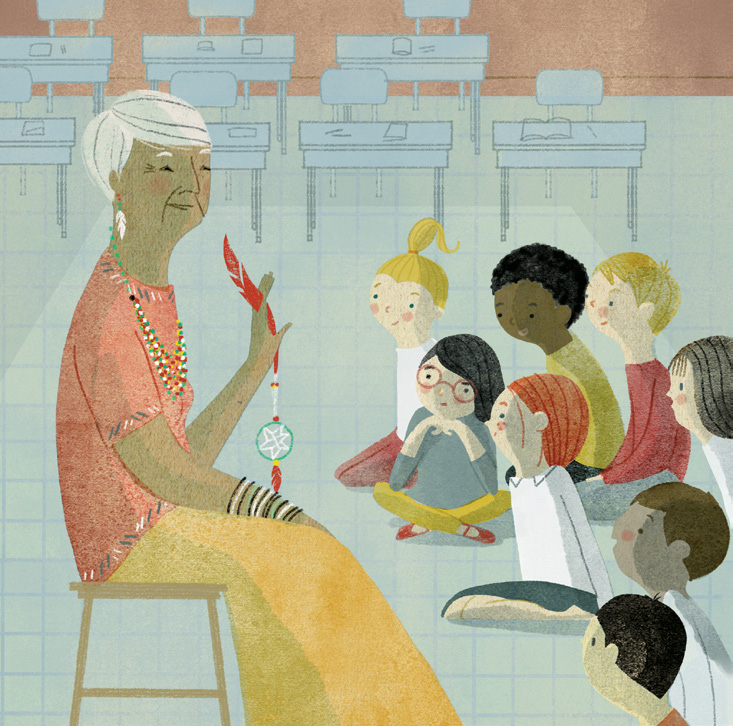Share this page
Illustration: Nathalie Dion/Anna Goodson

First Nations, Métis and Inuit communities traditionally transfer knowledge through Elders, who hold a responsibility to guide their youth in their life journey. Sharing their experiences through storytelling helps to build character in the next generation, and communities are seeing a resurgence of this special bond between the two, which is also true within education. Teachings include the Indigenous language, stories on community life from years ago, residential school experiences, as well as traditional arts and crafts. Ontario teachers are becoming more familiar with the educational potential of inviting Elders in for a visit. Depending on your location, Indigenous organizations, such as the National Association of Friendship Centres (nafc.ca), are the first point of contact for those looking to expand their students’ learning.
— Colleen Toulouse, OCT Enjikendaasang Learning Centre Sagamok Anishnawbek First Nation, Ont.
➞ Have a classroom idea to share? Send it to us at ps@oct.ca and your advice could be published in an upcoming issue! Check out our Professional Practice Research archive at oct-oeeo.ca/1QAwOIQ.
By Stefan Dubowski
LD@school (ldatschool.ca) is a new online resource compendium to help you support students with learning difficulties. Developed by the Learning Disabilities Association of Ontario (LDAO), this bilingual website covers topics for teachers who are starting to work in this area and for those looking to build on their experience.
Dive into the Learn About LDs section for a primer on brain-based learning and how it affects the way that an individual takes in, stores, recalls or uses verbal and non-verbal information. You’ll see what challenges students arefacing in different academic areas (reading, writing, math) and behaviour (social and emotional development, for instance). The Accommodations, Modifications & Alternative Skill Areas subsection details how you can adjust and customize your practice to ensure that all of your students succeed.
The Resources section shares a collection of articles that are searchable by grade level (K–12), topics (including Dual Diagnosis, Behaviour, Technology, Transitions), resource type (including Article, Podcast, Video, Ask the Experts), level of evidence (Practice-Informed, Evidence-Informed, Evidence-Based). You’ll also see links to webinars on, for instance, how to help students manage anxiety and teaching literacy to students who are differently abled.
There’s a section devoted to Learning Modules that contains 45- to 60-minute lessons on subjects like mental health and how to fortify student well-being, math instruction strategies, as well as how to use technology as a support tool.
That’s just a sample of the material that LD@school offers for free. Review the complete compendium of resources without having to sign up for an account. If you decide to sign up, you will have access to the My Favorite Posts and Pages feature, which allows you to save a list of the information you’re most interested in reading for later. You can also opt to receive biweekly email updates to ensure you stay current.